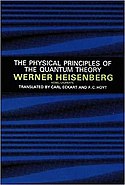
Summary
The Physical Principles of the Quantum Theory (German: Physikalischen Prinzipien der Quantentheorie publisher: S. Hirzel Verlag, 1930) by Nobel laureate (1932) Werner Heisenberg and subsequently translated by Carl Eckart and Frank C. Hoyt. The book was first published in 1930 by University of Chicago Press. Then in 1949, according to its copyright page, Dover Publications reprinted the "unabridged and unaltered" 1930's version.
 Book cover | |
| Author | Werner Heisenberg |
|---|---|
| Original title | Physikalischen Prinzipien der Quantentheorie |
| Translator | Carl Eckart and Frank C. Hoyt |
| Country | Germany |
| Language | German and English |
| Series | Dover books on physics |
| Subject | Quantum theory |
| Genre | Non-fiction |
| Published | Germany, United States |
| Publisher | S. Hirzel Verlag, University of Chicago Press, Dover Publications |
Publication date | 1930 |
Published in English | 1930, 1949, 2009, 2013, 2015 |
| Media type | Print, ebook |
| Pages | 183 (1st edition) |
| ISBN | 9780486601137 |
| OCLC | 551956049 |
| 530.1 | |
| LC Class | QC174.1 .H4 |
| Website | Publisher |
The book is collection of 1929 university lectures by Heisenberg but with more detailed mathematics.[1] The book discusses quantum mechanics and one 1931 review states that this is a "less technical and less involved account of the theor[y]".[2] This book has been cited more than 2,000 times.[3]
In the book, after briefly discussing various theories, including quantum theory, Heisenberg discusses the basis for the fundamental concepts of quantum theory. Also by this time Heisenberg has stated, "the interaction between observer and object causes uncontrollable and large changes in the [atomic] system being observed...".[1] In this work Heisenberg also discusses his uncertainty principle or uncertainty relations.[1][4][5][6]
About the author edit
Werner Heisenberg (b. 1901 - d. 1976) was a renowned German theoretical physicist whose work pioneered and advanced quantum mechanics. He received his PhD in 1923 from Ludwig Maximilian University of Munich under Arnold Sommerfeld. He was awarded the 1932 Nobel Prize in Physics "for the creation of quantum mechanics, the application of which has led to the discovery of the allotropic forms of hydrogen".[7][8][9]
References edit
- ^ a b c — (1949) [1930]. The physical principles of the quantum theory. Translators Eckart, Carl; Hoyt, F.C. Dover. pp. 1–39. doi:10.1007/BF01699141. ISBN 9780486601137. S2CID 116094482.
- ^ "(1) an Outline of Wave Mechanics (2) the Physical Principles of the Quantum Theory (3) Quantum Chemistry: A Short Introduction in Four Non-Mathematical Lectures". Nature. 127 (3197): 193–194. 1931. Bibcode:1931Natur.127..193.. doi:10.1038/127193a0. S2CID 41081016.
- ^ The Physical Principles of the Quantum Theory. Google Scholar. 2013-09-07
- ^ Popper, Karl Raimund (1989). Quantum Theory and the Schism in Physics. New York: Routledge. pp. 60–63. ISBN 9781135859442.
- ^ Hargreves, J. (October 1932). "Reviewed Works: The Physical Principles of the Quantum Theory by W. Heisenberg...". The Mathematical Gazette. 16 (20): 285–287. doi:10.2307/3605939. JSTOR 3605939.
- ^ Compton, Arthur H. (April 4, 1931). "Because World Is Not Wholly Reliable It Has Human Meaning". The Science News-Letter. 19 (521): 211–212. doi:10.2307/3907165. JSTOR 3907165. (Book review)
- ^ Heisenberg, W. (1924). "Über eine Abänderung der formalen Regeln der Quantentheorie beim Problem der anomalen Zeeman-Effekte". Zeitschrift für Physik. 26 (1): 291–307. Bibcode:1924ZPhy...26..291H. doi:10.1007/BF01327336. S2CID 186215582. as cited in Mott, N.; Peierls, R. (November 1977). "Werner Heisenberg". Biographical Memoirs of Fellows of the Royal Society. 23: 243. doi:10.1098/rsbm.1977.0009. S2CID 73128582.
- ^ The Nobel Prize in Physics 1932. Nobelprize.org. Retrieved on September 16, 2019.
- ^ 1933 – Nobel Prize Presentation Speech.
External links edit
- Official website
- The Physical Principles Of The Quantum Theory. by Werner Heisenberg. Archive.org


